Papers by Marianthi (Marianna) Karatsiori
Innovations in Education and Teaching International, Sep 11, 2023
Innovations in Education and Teaching International, Sep 11, 2023
Apples: journal of applied language studies, Jun 23, 2015
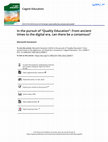
Cogent Education, Nov 30, 2023
The article begins with a discussion on the importance, subjectivity, and longstanding search for... more The article begins with a discussion on the importance, subjectivity, and longstanding search for a definition for Quality Education (QE). It conceptualizes QE in terms of “resilience” and “responsibility towards other”. It reviews the theoretical landscape and philosophical contributions of philosophers and learning theories to the field of education. It seeks to identify salient principles of QE from ancient times to the digital era and it speculates of how philosophers and learning theories would have thought about digital pedagogy today. Three principles of QE are proposed: 1) mutual respect and reciprocity, 2) differentiated and student-centered instruction, 3) attainment of knowledge for a virtuous humanity, along with two universal, timeless values: Equity and Democracy. The paper concludes with a discussion of how democracy and equity could be supported by Nussbaum’s model of human development as to cultivate the ethos of schools in the digital ages and transform QE into classroom practices.
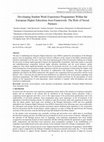
International Education Studies, Oct 27, 2021
The aim of establishing the European Higher Education Area (EHEA) marked the development of the B... more The aim of establishing the European Higher Education Area (EHEA) marked the development of the Bologna process since its beginning, while it exercised a decisive influence on the content of the higher education policy initiatives undertaken over the years. One of the most important goals of the relevant policy making was to bridge the university-to-labour market gap and to improve the employability of graduates. Such aims require a consistent and multidimensional cooperation between higher education institutions and the social partners, mainly employers, from which significant benefits may derive for all parties involved. As a result, many types of work based learning have been promoted in higher education with the most prominent of them being the student work experience programmes organised by universities in collaboration with enterprises. The paper analyses the guidelines provided by the EHEA framework with regard to the cooperation between universities and the social partners. Also, it discusses the role that has been attributed to (or claimed by) the social partners regarding work experience programmes. The EHEA institutional framework includes provisions for the participation of social partners in the organisation of work placements, which contribute to students' skills development and easier transition to employment.
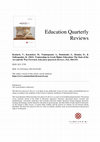
Education Quarterly Reviews, Dec 30, 2022
The Education Quarterly Reviews is an Open Access publication. It may be read, copied, and distri... more The Education Quarterly Reviews is an Open Access publication. It may be read, copied, and distributed free of charge according to the conditions of the Creative Commons Attribution 4.0 International license. The Asian Institute of Research Education Quarterly Reviews is a peer-reviewed International Journal. The journal covers scholarly articles in the fields of education, linguistics, literature, educational theory, research, and methodologies, curriculum, elementary and secondary education, higher education, foreign language education, teaching and learning, teacher education, education of special groups, and other fields of study related to education. As the journal is Open Access, it ensures high visibility and the increase of citations for all research articles published. The Education Quarterly Reviews aims to facilitate scholarly work on recent theoretical and practical aspects of education.
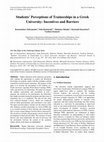
Universal Journal of Educational Research, Dec 1, 2022
Higher education work experience programs offer students the opportunity to connect the theoretic... more Higher education work experience programs offer students the opportunity to connect the theoretical knowledge of academic studies with the workplace and the acquisition of professional experience. The purpose of this paper is to examine the perceptions of the students of a Greek university regarding Work Based Learning (WBL) with a special focus on traineeships. The paper investigates the students' expectations and conceptions of such a program, the incentives for participation, the difficulties they might encounter during the program and their sense of attainment once it is completed. The data for this study were collected through a survey, which was conducted with an online questionnaire and constituted a case study. The paper used descriptive statistics for the analysis of the data. Students consider traineeships as a form of WBL that is an essential element of their learning and acknowledge that it creates strong linkages between theory and practice. The incentives towards such programs concern mostly the development of hard and soft skills. The existence of many barriers and, most importantly, the lack of relevancy and the mismatches between the content of the academic studies and the work duties are highlighted.
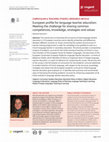
Cogent Education, Jun 24, 2016
This article aims to illuminate the structure of initial language teacher education in 25 Europea... more This article aims to illuminate the structure of initial language teacher education in 25 European countries and to identify similarities and differences between different countries on issues concerning the content and structure of teacher training programmes in order for somebody to be qualified to work as a French language teacher in secondary education. The article provides a comparative analysis of academic curricula for the initial training of teachers of French in countries members of the European Centre for Modern Languages. The document of the European Commission European Profile for Language Teacher Education-a Frame of Reference (2004), which identifies 40 items as important items in foreign language teacher education, is a point of reference for conducting the survey. The primary aim of the survey is the formulation of conclusions for the academic curricula addressed to student teachers of French language, with respect to the structure, knowledge, strategies and values that the European academic curricula for initial language teacher education give emphasis on. It identifies best practices and recommends ways of improving the existing academic curricula for enhancing cooperation of all those involved in language teacher education policy.
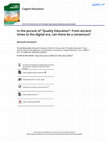
In the pursuit of “Quality Education”: From ancient times to the digital era, can there be a consensus?, 2023
The article begins with a discussion on the importance, subjectivity, and longstanding search for... more The article begins with a discussion on the importance, subjectivity, and longstanding search for a definition for Quality Education (QE). It conceptualizes QE in terms of “resilience” and “responsibility towards other”. It reviews the theoretical landscape and philosophical contributions of philosophers and learning theories to the field of education. It seeks to identify salient principles of QE from ancient times to the digital era and it speculates of how philosophers and learning theories would have thought about digital pedagogy today. Three principles of QE are proposed: 1) mutual respect and reciprocity, 2) differentiated and student-centered instruction, 3) attainment of knowledge for a virtuous humanity, along with two universal, timeless values: Equity and Democracy. The paper concludes with a discussion of how democracy and equity could be supported by Nussbaum’s model of human development as to cultivate the ethos of schools in the digital ages and transform QE into classroom practices.
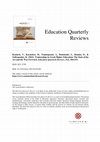
Education Quarterly Reviews
The paper studies the establishment of work experience programs in the context of the Greek Highe... more The paper studies the establishment of work experience programs in the context of the Greek Higher Education Institutions (HEIs) and connects it with the attempts to include Work-Based Learning (WBL) in the education system on a large scale. Emerging challenges caused by two significant recent changes in the Greek Higher Education landscape set the aim of this study. The integration of Technological Education Institutions in Higher Education Institutions and a significant financial change initiated by the new law which transfers the cost of compensation for traineeships to host institutions and not to Operational Programs. The paper presents the current state of the art in the Greek Higher Education and provides a detailed analysis of the existing barriers. The particular study acquires special interest in light of the intensification of the efforts made all over the world aiming to improve the organization and implementation of such interventions. Work experience programs offered b...

International Journal of Teacher Education and Professional Development, 2021
This article focuses on peer online professional development methods for in-service English langu... more This article focuses on peer online professional development methods for in-service English language teachers. In the digital era, teacher education is in constant change, and online collaborative professional development methods using social media, digital platforms, and tools can be an interesting way in which to create a community of practice where English teachers can engage in generating and jointly developing digital learning content, new conceptions, and models of teaching within an environment of trust. The selected examples will demonstrate how English language teachers can take the role of a teacher-coach and actively engage other English language teachers in tech integration that is deeply embedded in subject matter, as opposed to offering stand-alone lessons on how to use technology. The flipped classroom approach will be liaised with concrete techniques of developing ICT skills and enriching teachers' practices. The methods presented can be used to deliver refresher...
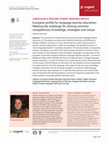
Cogent Education, 2016
This article aims to illuminate the structure of initial language teacher education in 25 Europea... more This article aims to illuminate the structure of initial language teacher education in 25 European countries and to identify similarities and differences between different countries on issues concerning the content and structure of teacher training programmes in order for somebody to be qualified to work as a French language teacher in secondary education. The article provides a comparative analysis of academic curricula for the initial training of teachers of French in countries members of the European Centre for Modern Languages. The document of the European Commission European Profile for Language Teacher Education-a Frame of Reference (2004), which identifies 40 items as important items in foreign language teacher education, is a point of reference for conducting the survey. The primary aim of the survey is the formulation of conclusions for the academic curricula addressed to student teachers of French language, with respect to the structure, knowledge, strategies and values that the European academic curricula for initial language teacher education give emphasis on. It identifies best practices and recommends ways of improving the existing academic curricula for enhancing cooperation of all those involved in language teacher education policy.
Supporting Course and Programme Leaders in Higher Education, 2022
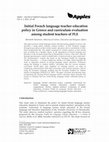
Apples - Journal of Applied Language Studies, 2015
This paper presents initial language teacher education policy adopted in Greece and describes a s... more This paper presents initial language teacher education policy adopted in Greece and describes a study which examines student teachers’ of FLE (Français Langue Étrangère) perception of their initial teacher education and its contribution to their future professional life. The sample comprised 67 student teachers in their fourth year of studies for a bachelor degree in the department of French language and literature in the Aristotle University of Thessaloniki in Greece. Data were collected through questionnaires which included both a structured and an open-ended part. The questionnaire’s content was based on the European Profile for Language Teacher Education — a Frame of Reference (Kelly et al 2004), which identifies 40 items as important elements in foreign language teacher education. Prominent among the findings is student teachers’ perception that the current academic curriculum should place more emphasis on teaching practice, on ways of reinforcing communication with other unive...

International Education Studies
The aim of establishing the European Higher Education Area (EHEA) marked the development of the B... more The aim of establishing the European Higher Education Area (EHEA) marked the development of the Bologna process since its beginning, while it exercised a decisive influence on the content of the higher education policy initiatives undertaken over the years. One of the most important goals of the relevant policy making was to bridge the university-to-labour market gap and to improve the employability of graduates. Such aims require a consistent and multidimensional cooperation between higher education institutions and the social partners, mainly employers, from which significant benefits may derive for all parties involved. As a result, many types of work based learning have been promoted in higher education with the most prominent of them being the student work experience programmes organised by universities in collaboration with enterprises. The paper analyses the guidelines provided by the EHEA framework with regard to the cooperation between universities and the social partners. ...

International Journal of Teacher Education and Professional Development (IJTEPD), 2021
This article focuses on peer online professional development methods for in-service English langu... more This article focuses on peer online professional development methods for in-service English language teachers. In the digital era, teacher education is in constant change, and online collaborative professional development methods using social media, digital platforms, and tools can be an interesting way in which to create a community of practice where English teachers can engage in generating and jointly developing digital learning content, new conceptions, and models of teaching within an environment of trust. The selected examples will demonstrate how English language teachers can take the role of a teacher-coach and actively engage other English language teachers in tech integration that is deeply embedded in subject matter, as opposed to offering stand-alone lessons on how to use technology. The flipped classroom approach will be liaised with concrete techniques of developing ICT skills and enriching teachers' practices. The methods presented can be used to deliver refresher...
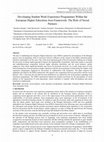
International Education Studies
The aim of establishing the European Higher Education Area (EHEA) marked the development of the B... more The aim of establishing the European Higher Education Area (EHEA) marked the development of the Bologna process since its beginning, while it exercised a decisive influence on the content of the higher education policy initiatives undertaken over the years. One of the most important goals of the relevant policy making was to bridge the university-to-labour market gap and to improve the employability of graduates. Such aims require a consistent and multidimensional cooperation between higher education institutions and the social partners, mainly employers, from which significant benefits may derive for all parties involved. As a result, many types of work based learning have been promoted in higher education with the most prominent of them being the student work experience programmes organised by universities in collaboration with enterprises. The paper analyses the guidelines provided by the EHEA framework with regard to the cooperation between universities and the social partners. ...
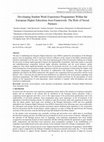
International Education Studies
The aim of establishing the European Higher Education Area (EHEA) marked the development of the B... more The aim of establishing the European Higher Education Area (EHEA) marked the development of the Bologna process since its beginning, while it exercised a decisive influence on the content of the higher education policy initiatives undertaken over the years. One of the most important goals of the relevant policy making was to bridge the university-to-labour market gap and to improve the employability of graduates. Such aims require a consistent and multidimensional cooperation between higher education institutions and the social partners, mainly employers, from which significant benefits may derive for all parties involved. As a result, many types of work based learning have been promoted in higher education with the most prominent of them being the student work experience programmes organised by universities in collaboration with enterprises. The paper analyses the guidelines provided by the EHEA framework with regard to the cooperation between universities and the social partners. ...
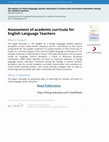
European Journal of Language Policy, 2015
This paper describes a study which examines EFL (English as a Foreign Language) student teachers’... more This paper describes a study which examines EFL (English as a Foreign Language) student teachers’ perception of their initial teacher education and its contribution to their future professional life. The sample comprised 112 student teachers in their fourth year of studies for a bachelor degree in the school of English language and literature in the Aristotle University of Thessaloniki in Greece. The study was based on the European Profile for Language Teacher Education: A Frame of Reference (Kelly et al. 2004), which identifies 40 items as important elements in foreign language teacher education. Prominent among the findings is student teachers’ perception that the current academic curriculum should place more emphasis on school-based teaching practice, on active learning and on ways of reinforcing communication with other universities and research institutes. The paper concludes by proposing ways of improving the existing curriculum of initial language teacher education.
Ce document décrit une étude qui examine la perception de futurs enseignants d’EFL (Anglais comme Langue étrangère) de leur formation initiale des enseignants et sa contribution à leur future vie professionnelle. L’échantillon comprenait 112 élèves-maîtres dans leur quatrième année d’études pour un baccalauréat au département de langue et littérature anglaise de l’Aristote Université de Thessalonique en Grèce. L’étude a été basée sur le Profil Européen pour la formation des enseignants de langue: un cadre de référence (Kelly et al., 2004), qui identifie 40 articles comme des éléments importants à la formation des enseignants des langues étrangères. Parmi les résultats importants sont la perception de futurs enseignants que le curriculum académique devrait mettre davantage l’accent sur la pratique de l’enseignement en milieu scolaire, sur l’apprentissage actif et sur les moyens de renforcer la communication avec d’autres universités et instituts de recherche. L’article conclut en proposant des moyens d’améliorer le curriculum existant de la formation initiale des enseignants de la langue anglaise.











Uploads
Papers by Marianthi (Marianna) Karatsiori
Ce document décrit une étude qui examine la perception de futurs enseignants d’EFL (Anglais comme Langue étrangère) de leur formation initiale des enseignants et sa contribution à leur future vie professionnelle. L’échantillon comprenait 112 élèves-maîtres dans leur quatrième année d’études pour un baccalauréat au département de langue et littérature anglaise de l’Aristote Université de Thessalonique en Grèce. L’étude a été basée sur le Profil Européen pour la formation des enseignants de langue: un cadre de référence (Kelly et al., 2004), qui identifie 40 articles comme des éléments importants à la formation des enseignants des langues étrangères. Parmi les résultats importants sont la perception de futurs enseignants que le curriculum académique devrait mettre davantage l’accent sur la pratique de l’enseignement en milieu scolaire, sur l’apprentissage actif et sur les moyens de renforcer la communication avec d’autres universités et instituts de recherche. L’article conclut en proposant des moyens d’améliorer le curriculum existant de la formation initiale des enseignants de la langue anglaise.
Ce document décrit une étude qui examine la perception de futurs enseignants d’EFL (Anglais comme Langue étrangère) de leur formation initiale des enseignants et sa contribution à leur future vie professionnelle. L’échantillon comprenait 112 élèves-maîtres dans leur quatrième année d’études pour un baccalauréat au département de langue et littérature anglaise de l’Aristote Université de Thessalonique en Grèce. L’étude a été basée sur le Profil Européen pour la formation des enseignants de langue: un cadre de référence (Kelly et al., 2004), qui identifie 40 articles comme des éléments importants à la formation des enseignants des langues étrangères. Parmi les résultats importants sont la perception de futurs enseignants que le curriculum académique devrait mettre davantage l’accent sur la pratique de l’enseignement en milieu scolaire, sur l’apprentissage actif et sur les moyens de renforcer la communication avec d’autres universités et instituts de recherche. L’article conclut en proposant des moyens d’améliorer le curriculum existant de la formation initiale des enseignants de la langue anglaise.
Acknowledging the new international working demands, following the major expansion that the European Union has recently undergone and the overall globalization, the methodology of CLIL in teaching and learning English seems to be the best solution for university students, since its benefits may be seen in terms of cultural awareness, internationalisation, language competence, preparation for both study and working life, and increased motivation. The curriculum of the department of Marketing and Operations Management of the University of Macedonia, in Edessa includes the following compulsory subjects at the 1st and 2nd year of studies: “Academic Vocabulary in English and Reading Comprehension Skills” - English I, “Writing for Academic Purposes in English” - English II, “Vocational English” - English III and “Presentation skills”- English IV. The English teachers attempt to develop learning material by selecting contemporary authentic texts from worldwide known financial magazines and websites and by designing activities so as to improve specific skills. In the course “Academic Vocabulary in English and Reading Comprehension Skills” students are introduced to a variety of authentic financial texts, such as newspaper articles, articles published on the Internet, book extracts etc, in order to enrich their vocabulary, familiarize them with the different written genres and improve different techniques of reading. The course “Writing for Academic Purposes” focuses on developing students’ abilities to classify, organize, compose and formulate a text in a coherent way. The different parts of a thesis, content and form (preface-introduction-chapters-conclusion-notes-indexes-references) are also explored. The courses “Vocational English” and “Presentation skills” are conducted mostly via Information Communication Technology. Among others, students write their Curriculum Vitae in English by using the site of European Commission, a motivation letter, a thank you letter to their employer, a report about a colleague and, as an assignment, they are asked to present an international company (using PowerPoint).
Accepting the aforementioned and focusing on the learner’s active participation, this research aims at observing and investigating learners’ needs and views by engaging them in the process of self assessment and evaluation of the course. More specifically, the aims of this research are: to introduce self-evaluation and self-assessment in ESP learning and teaching and more importantly to study and explore learners' attitudes and needs in terms of the usefulness of the various activities, materials, tools, lesson plans, class organisation methods adopted in content teaching in a foreign language. In the case of the department of Marketing and Operations Management, content teaching refers to business and financial issues.
that Greek students embrace. The main object of this paper is to point out that representations can be taken into account during the process of language learning, to overcome stereotypes, for example, or to make the most of the ways in which languages are interrelated. It is thus an important element of language education policy planning to analyse existing representations and how these need to be taken into account in promoting language learning.